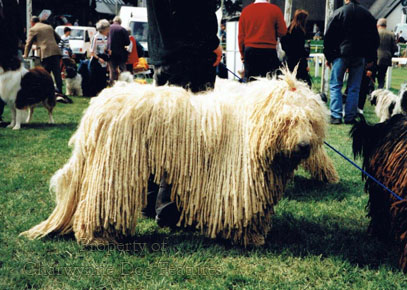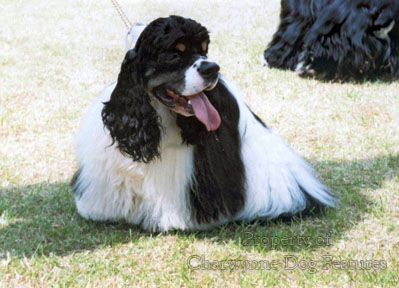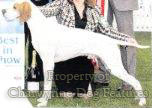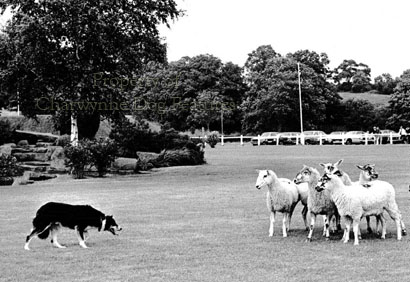196 Speaking Up For Dogs
SPEAKING WITH ONE VOICE
by David Hancock
 Last year I was visiting a national dog show when I bumped into someone well-known in the pedigree dog world as an owner/exhibitor, writer and judge. "Fancy seeing you at a dog show" he said, a little sarcastically, aware of my sustained critical writing over many years on such aspects as failures in the stewardship of our pedigree dog scene and the lamentable lack of soundness in many contemporary breeds. I hadn't the heart to tell him that I started attending dog shows before he was born.
Last year I was visiting a national dog show when I bumped into someone well-known in the pedigree dog world as an owner/exhibitor, writer and judge. "Fancy seeing you at a dog show" he said, a little sarcastically, aware of my sustained critical writing over many years on such aspects as failures in the stewardship of our pedigree dog scene and the lamentable lack of soundness in many contemporary breeds. I hadn't the heart to tell him that I started attending dog shows before he was born.
A few months later I was judging the retriever tests at a country fair when I mentioned to a competitor over lunch that I had seen some good dogs from his breed at Crufts that year. "My God!" he exclaimed, almost with a snarl, "you don't waste your time there, do you?" A week later I was scanning one of the weekly dog papers when my eye caught a piece about lurcher and working terrier shows, pouring scorn on the judging technique used in them and calling the whole business a meaningless charade. When summer came it was not pleasing to hear spiteful comments from pedigree dog exhibitors about the mongrel entry at our local village fete's dog show.
My interest in dogs takes me to sheepdog trials, working tests, hound shows, conformation dog shows, lurcher and terrier shows, seminars and society meetings. In each of these activities, I find well-intentioned people striving to contribute something towards either better dogs or the betterment of dogs. But each specialist in his field can be unaware of the contribution, potential or actual, of another. I learned more about assessing canine movement from houndshow judges than anywhere else. I learned more about communicating with dogs from shepherds than from gamekeepers. I hear more nonsense talked by well-educated dog fanciers than by lurcher and terrier devotees who sometimes have had very little formal education. But, I believe I am better informed from having listened to them all.
These are difficult days in dogdom. When I was young, Dangerous Dog Acts, docking and displaced hips were not the dilemmas of the day. Congenital and inheritable diseases were not common topics of conversation in most breeds. But, no breeder then seemed to want to produce dogs with roach backs, excessively heavy coats, ruggerball shaped heads, questionable temperaments, exaggerated sickle hocks or string their dogs up on a choke cord in the show ring. A different foreign breed wasn't introduced every few months with a hyperbolised ancestry and dodgy pedigree. I have enormous respect for the pedigree dog breeders I learned from in the 1950s. So many of the gundog fanciers then worked their dogs. Many of the judges also judged horses and knew about movement. There seemed to be closer links between the 'flags' and the field. When I worked as a kennel boy for my local vet, he acknowledged only too readily the knowledge and skill of the dog breeders he served .
.
Now we have vets who refuse their clients a service, not because they think the nature of the service is clinically incorrect but because their professional body has decided that this service is morally incorrect. Moral vanity is the curse of our age; it is so often selectively applied to suit prejudices. We now have vets too, who, without any relevant experience whatsoever, can identify dogs as belonging to a breed which doesn't actually exist as such. Perfectly healthy harmless dogs are being destroyed as a direct result, condemned by a profession claiming to have a code of ethics. Arrogance can be as deadly as ignorance; veterinary wisdom doesn't seem to be keeping pace with veterinary knowledge.
We also now have a society, a charity founded to protect all dogs, spending a sizeable chunk of its resources, demanding too -- with their sadly all too willing allies in a police force which seems at times to have lost its way -- huge sums of public money in prosecuting otherwise blameless citizens for owning a dog of a breed which might one day commit an offence. This society was not formed to prevent cruelty to human beings or to decide, with twentieth century eyes, the length of dogs' tails, after centuries of established practice. Fortunately, history tells us that no institution lasts long with "grosse tete et peu de sens".
What we really need is a club, a national club, set up by like-minded dog fanciers, to promote dogs whether they are to demonstrate correctness of conformation in the show ring or functional prowess in the field. Such a club would need to be London-based, so that it would be well placed to influence events -- and politicians, when the need arose. This club would be a charity, in spirit as well as in status, selflessly using its good offices to bring together to a common purpose: shots and shepherds, vets and canine rescue charities, guidedogs and gundogs, lurchermen and working terrier fanciers, houndshow supporters and dog show devotees, agility and obedience groups, the sledders and the trackers. Above all else, this club would be able to speak with one voice -- the voice which the dogs themselves cannot make heard.
But what does human experience tell us to beware of in such an organisation? Firstly it must never become more of a club than a charity. Secondly the interests of the members must always come second to the needs of dogs. Thirdly it must never ever become a victim of its own bureaucracy, for example by setting up a Council of Representatives (a coordinating body), then allowing it to drift into a system of Liaison Councils (talking shops). But fourthly it must perpetually remind itself of its guardian role, its moral foundation.
Such a club seems to exist in the United States and is called the American Kennel Club, originally modelled, I understand on a similarly-named club in a European country. One of its senior executives is reported to have said on more than one occasion: "You should not ask what the AKC is doing for you but ask what you can do for the sport of dogs". That sounds like moral leadership to me; can we have a club for dogs like that please?
This unusual individual is also alleged to have said: "We (the AKC) stand squarely behind the fact that people should not breed dogs for profit; they should breed only to improve the breed". This particular club seems to have a moral dimension to their activities. But they don't just talk, they act too; in 1992 they struck off 240 breeders after conducting 3,400 inspections in the year. This illustrates very neatly the difference between executives and bureaucrats -- the latter are only able to see the difficulties in taking action, to accept excuses, to avoid accountability, to ask for further reports and to arrange yet another committee meeting. It doesn't take many meetings to stifle moral indignation.
An experienced bureaucrat can find endless reasons why carriers of inherited diseases should not be de-registered, why litters from puppy farms should not be refused registration and why it is inadvisable to admit how foolish you have been to sit at the same table as gormless legislators devising laws to destroy innocent dogs. A really professional bureaucrat can pass responsibility, almost imperceptibly, downwards -- to breed clubs, for example. What we really need is a club...
But this is Britain not America, let's muddle on. Let a bullterrier judge argue in court with a veterinary surgeon about breeding probabilities; let's form another council -- this time to accept responsibility for the length of dogs' tails debate; the 300 plus inheritable diseases? let's form a sub-committee to deal with that; let's lump together as one breed four shepherd dog breeds whilst dividing varieties of another breed into separate breeds by length of coat, texture of coat and size. But never at any time will even the canine bureaucrat lower his guard and accept responsibility. 
I am concerned that dogs are being adversely affected by this chronic reluctance by any national canine organisation to be prepared to provide moral leadership in these testing times. Dogs are themselves being penalised because of the lack of mutual respect in the wide-ranging world of the domestic dog. Breeders are not listening to what geneticists are telling us about genetic defects. The inspired work of the ISDS in reducing the incidence of PRA in working sheepdogs has not been mirrorred in the pedigree dog world. The considerable apathy of many breed societies over issues such as docking and dangerous dog legislation is not particularly admirable.
Each canine organisation, wherever based and however small, assumes, immediately it is established and whether it wants to or not, a moral responsibility for dependant living creatures embraced by their span. A small club can make disproportionate impact by vigorous lobbying and linking with others. But how much more effective their action would be if there were a virile campaigning central organisation, with a strong sustained moral motivation, pulling all interests together so that one even more powerful voice could really be heard. Until then, it is left mainly to strong-minded individuals to exercise whatever influence they can as guardians and catalysts for change. But is that truly the best deal we can collectively obtain for our dogs ?